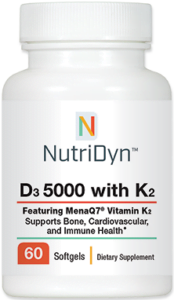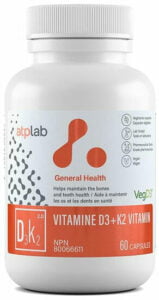Vitamin D, also known as calciferol or cholecalciferol, is a fat-soluble vitamin that the human body can produce on its own.
Your skin contains a type of cholesterol called 7-dehydrocholesterol that takes energy from the sun and converts it to vitamin D3. Vitamin D3 goes through the liver and kidneys to get transformed into an active form of vitamin D - 1,25 dihydroxy vitamin D.
What are the Food Sources of Vitamin D?
Food sources of vitamin D include (1):
- Cod liver oil
- Fatty fish such as sardines, herring, mackerel, salmon, and tuna
- Egg yolk
- Beef liver
Health Benefits of Vitamin D
Improves Bone Density
Vitamin D helps with bone mineralization and improves Bone Mineral Density (BMD) in two ways.
First, it improves blood calcium status. Second, it triggers the function of ‘bone forming’ cells (osteoblasts) in bones.
Research does not support the untargeted use of vitamin D for bone health in adults with normal vitamin D levels.
Instead, it only improves BMD in adults who are vitamin D deficient (2), which is kind of obvious.
If the vitamin D levels are optimal, there is no vitamin D deficiency causing the problem.
Improves Cognitive Function
Improved cognition is another important feature of normal vitamin D levels as it has neuroprotective, anti-oxidant, and anti-inflammatory effects.
Researchers speculate that age-related decline in cognition may be associated with a fall in vitamin D levels.
The risk of dementia and neurological diseases (like Alzheimer’s) increases several folds with increasing age.
Researchers have also found that as much as 54% of individuals with poor cognitive functions are deficient in vitamin D (3). It is important to mention here that the effect of Vitamin D in the improvement of learning and memory can be due to its positive effect on the Perineuronal Nets (PNN)
Results of some RCTs suggest that daily supplementation with 2000 IU/day vitamin D (which in my opinion is a very low dose) improves cognitive function scores among black individuals with cognitive impairment (4).
Research from the University of Queensland has shown that the hippocampus could be the first area affected by vitamin D deficiency due to the high activity levels of this area of the brain.
Improves Cardiovascular Health
Some evidence reports that vitamin D improves endothelial function.
The endothelium is the innermost layer of blood vessels and is crucial for maintaining the proper flow of blood.
Any damage to this layer leads to conditions such as high blood pressure, myocardial infarction, and stroke.
Researchers from Korea mentioned that low levels of vitamin D have been directly associated with elevations in blood pressure, due to its association with dietary calcium and phosphorus absorption, regulation of the renin-angiotensin-aldosterone system (RAAS) and renin gene expression, modulation of the immune and inflammatory pathways, and activity in endothelial function
Some RCTs support the role of vitamin D in maintaining cardiovascular health.
In one research, participants were divided into two groups.
One group received either 50,000 IU/week or 1,000 IU/week of vitamin D and the other group received a placebo.
Results showed reductions in blood pressure (5).
Other research has shown that the benefits of vitamin D3 are associated with a favorable rate of Nitric Oxide and Peroxynitrite, restoring the ratio between them, and the overall decrease in the overexpression of eNOS, inducible nitric oxide synthase and NADPH oxidase.
“This effect of vitamin D3 may prove to be beneficial in the treatment of hypertension and other cardiovascular diseases, including heart failure, myocardial infarction, vasculopathy, stroke, and diabetes.” (6)
Helps in Cancer Prevention
One of the most promising health benefits of vitamin D is its ability to reduce cancer incidence and increase survival among cancer patients.
Vitamin D reduces the supply of blood to the cancer tissues.
In addition, it prevents the rapid growth of cancer cells and limits their spread to other parts of the body (metastasis).
The VITAL Randomized Control Trial found that individuals taking >800 IU vitamin D per day had a significantly less chance of having cancer (reduced incidence) or dying from it (reduced mortality) (7).
Strengthens Immune System
Vitamin D has an extensive role in strengthening the immune system.
It helps in the growth and maturation of the different varieties of immunity cells.
It also aids in the production of chemicals (antibodies) that help target bacteria and viruses.
A meta-analysis summarizing 10 RCTs with more than 80,000 participants looked into the immune-modulating effects of vitamin D on individuals with common flu (influenza).
Results showed that individuals who took >2,000 IU vitamin D per day were significantly less likely to get influenza infections (8).
Vitamin D Has Profound Effects on Endocrine System
Vitamin D has profound effects on the endocrine system as it controls the release and activity of hormones such as parathyroid hormone and insulin.
These actions of vitamin D are mainly due to its ability to control calcium levels in the body.
An RCT conducted at the University of Missouri, Columbia, studied the effects of vitamin D supplementation on individuals with type 2 diabetes.
The participants were given 4,000 IU of vitamin D per day for 6 months.
Results showed vitamin D supplementation caused a significant improvement in baseline insulin levels and a decline in blood sugar levels
(9). Other research suggests that regular vitamin D supplementation can reduce insulin resistance by as much as 54% (10).
Improves Athletic Performance
Coaches have long recognized that exposure to sunlight improves athletic performance.
This fact has been validated by recent research as well that ties together the missing links between vitamin D levels and athletic performance.
Vitamin D, as previously mentioned, strengthens bones.
In addition, higher vitamin D intake or better exposure to sunlight, will improve vitamin D status, and improves the bulk and functioning of skeletal muscles too.
Results of research conducted at the Atascadero State Hospital, USA showed that exposure of vitamin D-deficient athletes to sunlight improved their performance and also decreased the risk of sports-related injuries/conditions (11).
A single dose of vitamin D can improve athletic performance.
In one RCT, researchers gave amateur athletes a single dose of 200,000 IU of vitamin D or a placebo.
They followed up with the participants for 12 weeks after the single dose.
Results showed that the vitamin D group had significantly improved jumping ability, running speed, and agility compared to the placebo group after 12 weeks (12).
Aids With Sleep Regulation
Vitamin D plays an important role in sleep regulation as well.
It helps with improving sleep quality and quantity.
Reduced levels of vitamin D in adults and children are associated with poor sleep quality, shorter duration, and frequent awakening.
A meta-analysis summarized 19 studies (including 13 RCTs) found that regular vitamin D supplementation improves sleep disorders.
It makes it easier to go to sleep, stay asleep, and wake up refreshed (13).
Reduces Inflammation
Vitamin D has a long story of successful use in order to reduce inflammation.
It has been shown to alleviate back pain, limb pain, fibromyalgia, and sarcopenia.
This Randomized Clinical Trial done with 580 subjects “showed that the high dose supplementation of vitamin D affects measures of systemic inflammation: reductions in High Sensitivity C-Reactive Protein level and Neutrophil-to-lymphocyte ratio (NLR) distribution.” (14)
How much Vitamin D do you need?
My personal preference is 4,000 – 5,000 IU per day, but of course, the dose varies depending on the vitamin levels of the subject, which ideally should be 80 ng/mL, and current health status.
These Are My Favorite Vitamin D Supplements
 |
 |
References
- https://www.hsph.harvard.edu/nutritionsource/vitamin-d/#:~:text=The%20best%20sources%20are%20the,high%20amounts%20of%20ultraviolet%20light.
- Reid IR, Horne AM, Mihov B, Gamble GD, Al-Abuwsi F, Singh M, Taylor L, Fenwick S, Camargo CA, Stewart AW, Scragg R. Effect of monthly high-dose vitamin D on bone density in community-dwelling older adults substudy of a randomized controlled trial. J Intern Med. 2017 Nov;282(5):452-460.
- Sommer I, Griebler U, Kien C, Auer S, Klerings I, Hammer R, Holzer P, Gartlehner G. Vitamin D deficiency as a risk factor for dementia: a systematic review and meta-analysis. BMC Geriatr. 2017 Jan 13;17(1):16.
- Kang, J.H., Vyas, C.M., Okereke, O.I. et al. Effect of vitamin D on cognitive decline: results from two ancillary studies of the VITAL randomized trial. 2021. Sci Rep 11, 23253.
- Sheikh V, Mozaianimonfared A, Gharakhani M, Poorolajal J, Ph D. Effect of vitamin D supplementation versus placebo on essential hypertension in patients with vitamin D deficiency: a double-blind randomized clinical trial. J Clin Hypertens (Greenwich). 2020 Oct;22(10):1867-1873
- Khan A, Dawoud H, Malinski T. Nanomedical studies of the restoration of nitric oxide/peroxynitrite balance in dysfunctional endothelium by 1,25-dihydroxy vitamin D3 - clinical implications for cardiovascular diseases. Int J Nanomedicine. 2018 Jan 19;13:455-466. doi: 10.2147/IJN.S152822. PMID: 29416330; PMCID: PMC5788997.
- N, Bubes V, Lee IM, Giovannucci EL, Willett W, Buring JE, Manson JE; VITAL Research Group. Effect of Vitamin D3 Supplements on Development of Advanced Cancer: A Secondary Analysis of the VITAL Randomized Clinical Trial. JAMA Netw Open. 2020 Nov 2;3(11):
- Zhu Z, Zhu X, Gu L, Zhan Y, Chen L, Li X. Association Between Vitamin D and Influenza: Meta-Analysis and Systematic Review of Randomized Controlled Trials. Front Nutr. 2022 Jan 7;8:799709. doi: 10.3389/fnut.2021.799709
- Belenchia AM, Tosh AK, Hillman LS, Peterson CA. Correcting vitamin D insufficiency improves insulin sensitivity in obese adolescents: a randomized controlled trial. Am J Clin Nutr. 2013 Apr;97(4):774-81.
- Talaei A, Mohamadi M, Adgi Z. The effect of vitamin D on insulin resistance in patients with type 2 diabetes. Diabetol Metab Syndr. 2013 Feb 26;5(1):8. doi: 10.1186/1758-5996-5-8.
- Cannell JJ, Hollis BW, Sorenson MB, et al. Athletic performance and vitamin D. Med Sci Sports Exerc. 2009 May;41(5):1102-10.
- Bezrati I, Ben Fradj MK, Hammami R, Ouerghi N, Padulo J, Feki M. A single mega dose of vitamin D3 improves selected physical variables in vitamin D-deficient young amateur soccer players: a randomized controlled trial. Appl Physiol Nutr Metab. 2020 May;45(5):478-485.
- Abboud M. Vitamin D Supplementation and Sleep: A Systematic Review and Meta-Analysis of Intervention Studies. Nutrients. 2022 Mar 3;14(5):1076.
- Tabatabaeizadeh SA, Avan A, Bahrami A, Khodashenas E, Esmaeili H, Ferns GA, Abdizadeh MF, Ghayour-Mobarhan M. High Dose Supplementation of Vitamin D Affects Measures of Systemic Inflammation: Reductions in High Sensitivity C-Reactive Protein Level and Neutrophil to Lymphocyte Ratio (NLR) Distribution. J Cell Biochem. 2017 Dec;118(12):4317-4322. doi: 10.1002/jcb.26084. Epub 2017 Jun 9. PMID: 28425575.

